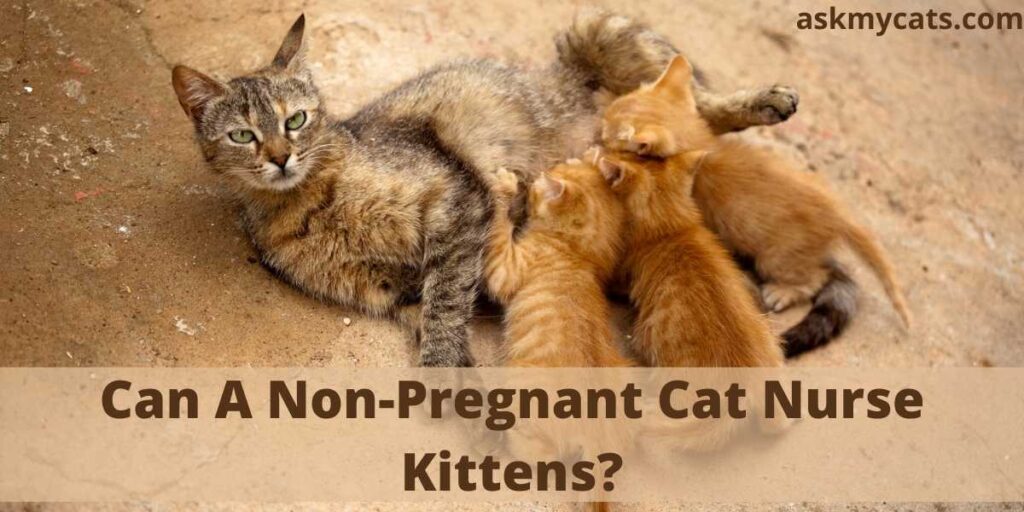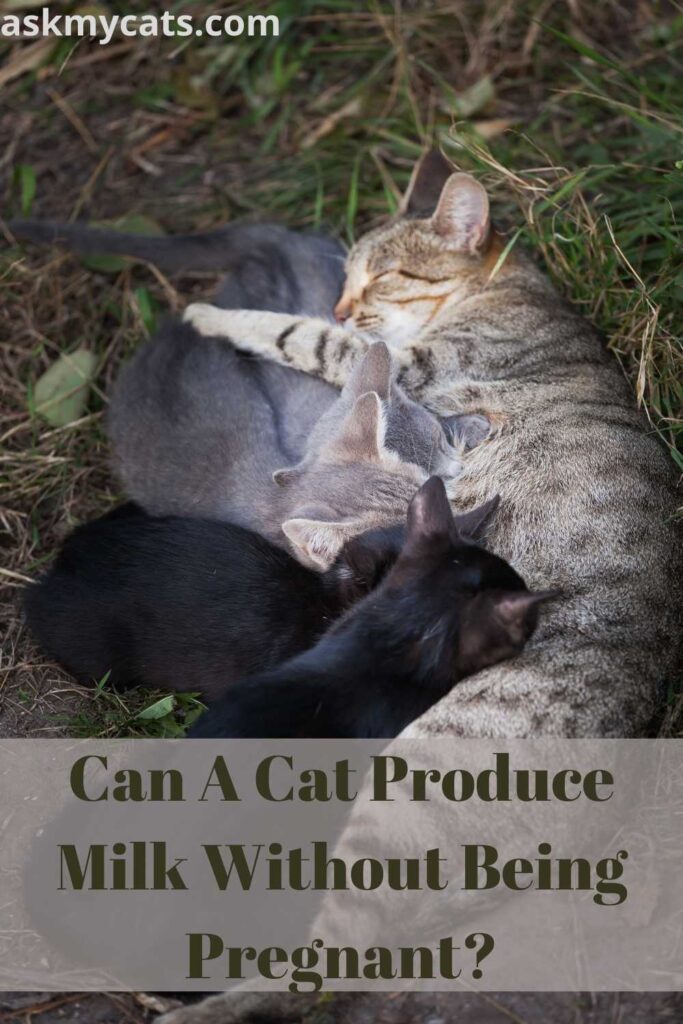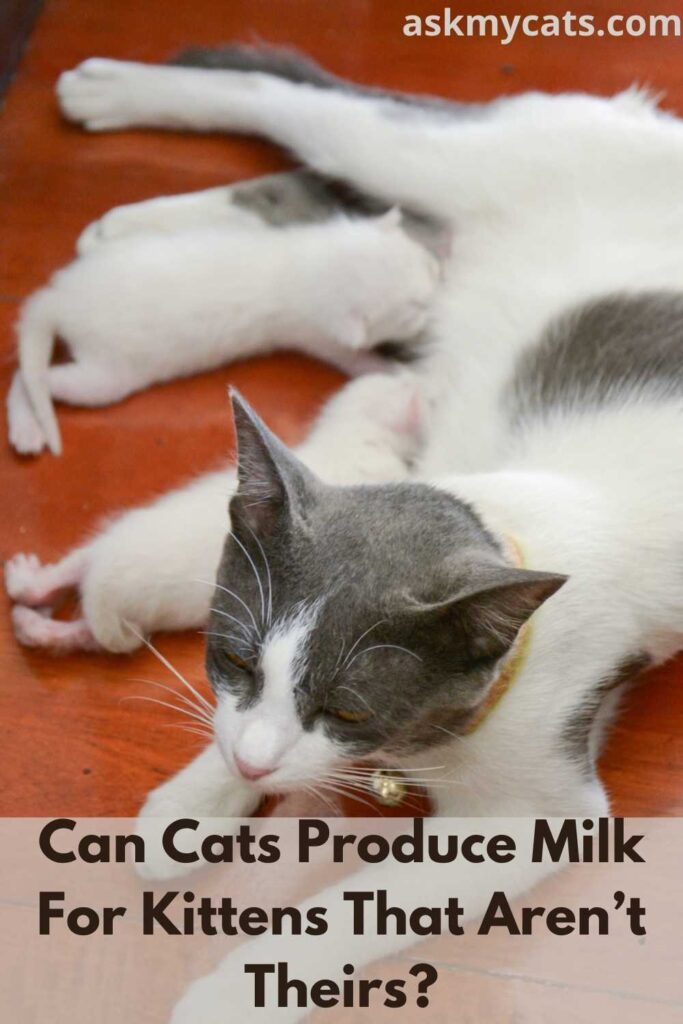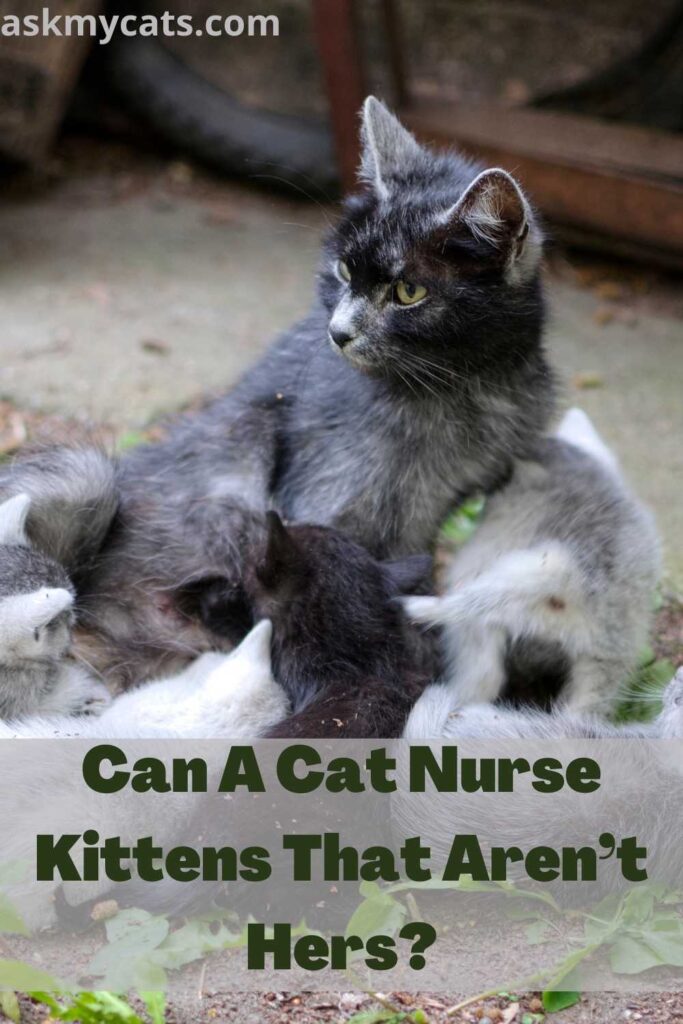Cats are often thought to be solitary creatures, but this isn’t always the case. Mama cats are quite maternal and may readily look after kittens that aren’t connected to them.
In most circumstances, a mother cat will accept orphaned kittens immediately and without much fuss.
However, can a non-pregnant cat nurse kittens?
Yes, a non-pregnant cat nurse kittens. When female cats are not pregnant, they may produce lactate, which is milk. This can happen to even spayed females. A condition known as a false pregnancy, phantom pregnancy, or pseudopregnancy causes this.
The feline reproductive system differs slightly from that of humans. It is highly dependent on the act of mating. Hormonal imbalances, like humans, can be one of several possible reasons.
This article will talk in depth about how a non-pregnant cat can nurse kittens.


Give Your Cat the Perfect Day
Get the Free Ebook!
Can A Cat Produce Milk Without Being Pregnant?
Yes, a cat can produce milk without being pregnant.

Cats, unlike humans, do not generally ovulate until they are in the process of mating.
According to the Cat Health Guide, 30 to 35 percent of queens, or female cats who have not been spayed, ovulate even if they have not mated.
This will create pregnancy signs, such as milk production.
Lactation can also be caused by an imbalance of the hormones progesterone and prolactin.
The hormone progesterone induces pregnancy symptoms, whereas prolactin causes lactation or milk production.
Spaying might result in false pregnancies and milk production in certain cats. According to experts, this condition can occur 3 to 4 days after the uterus and ovaries have been removed.
According to Vets, if cats are spayed during the diestrus stage of their heat, or reproductive, cycle, they may have a false pregnancy and produce milk.
You might be interested in when can i get my cat spayed after having kittens
Mating with an infertile tom or male cat can also result in a false pregnancy. Females generally ovulate as a result of the act of mating, as previously stated.
An egg is released but never fertilized when a female mates with an infertile male. The female’s body reacts as if she is pregnant when the egg is released, even though she is not.
Hypothyroid cats are more likely to have false pregnancies and produce milk. It is caused in this situation by a variety of blood alterations. This is, however, a rare occurrence.
You might also like to read about can a spayed cat get pregnant
Can Cats Produce Milk For Kittens That Aren’t Theirs?
Yes, cats can produce milk for kittens that aren’t theirs.

You’ve probably heard stories about a mother cat nursing orphaned kittens, squirrels, and even puppies.
This isn’t unusual, and a mother cat who has recently given birth is frequently willing to look after extra kittens.
If the orphaned kitten is of similar age to her foster mama’s litter, or if the foster mama has recently weaned, the newcomer is likely to be accepted without difficulty.
Some mothers accept new kittens right away, while others may take a few hours or even a day or two to warm up to them.
It all depends on the nature of the maternal cat; some are wonderful foster mothers, while others aren’t interested.
Cats may appear aloof, yet their maternal instincts are extremely powerful. A queen with a litter of her own is the animal most likely to take in orphaned kittens, but that isn’t the only possibility.
Must Read: Can A Spayed Cat Nurse Kittens?
Even if they are unable to nurse the infants – and they will most likely do so if they are – cats will frequently care for and nurture them alongside their own family.
The fact that cats will nurse and raise another kitten that would otherwise be prey emphasizes how incredible these creatures are.
Cats who get along will often share parental responsibilities for kittens, even nursing each other’s babies if they’re able.
I used to know two female indoor/outdoor farm cats who did just that.
These two, who were neither barn cats nor house cats, had a lot of litters over the years. One of them was a fantastic mother, while the other was less so.
The more maternal of the two would take the other’s kittens and nurse and raise them as her own (she never fought over it).
The kittens fared admirably – far better than they would have if they had been left with their own mother, who had a goldfish-like attention span.
Cats who do not have, or have never had, a litter of their own can make wonderful adoptive parents.
You might also like to read about can cats get pregnant when not in heat
Can A Cat Nurse Kittens That Aren’t Hers?
Yes, a cat can nurse kittens that aren’t hers.

Cats are frequently mistaken for solitary creatures, however, this is not always the case.
Mama cats are quite maternal, and they may be willing to look after children who aren’t related to them.
In the majority of cases, a mother cat will take orphaned kittens without hesitation.
You’ve probably heard tales of orphaned kittens, being fed by a mother cat.
This isn’t uncommon, and a mother cat who has recently given birth is often eager to care for additional kittens.
If the orphaned kitten is the same age as her foster mama’s litter, or if the foster mama has recently weaned, the newcomer is likely to be accepted with ease.
Some moms are quick to accept new kittens, while others may take a few hours or even a day to get up to them.
It all depends on the mom cat’s personality; some are great foster mothers, while others aren’t.
It’s possible that your mama cat’s rejection of the new kitten isn’t just because she’s being tough.
When it comes to illness, cats seem to have a sixth sense, and if a mama cat detects something wrong with her babies, she may refuse to care for them.
It’s possible that the orphaned kitten’s mother abandoned her because she knew something was wrong with her, and your mama cat is acting the same way.
You might also like to read about how to tell if a mother cat has abandoned her kittens
Survival of the fittest is engrained in most species, even if it appears cruel. A mother cat does not want to waste her milk or energy on a newborn that will almost certainly die.
You can’t compel a mama cat to adopt a new kitten, despite the fact that there are techniques to urge her to do so.
Some cats just refuse to interact with a kitten who isn’t their own. In this instance, you have the option of looking for another foster mother or raising the kitten on your own.
Keep in mind that raising kittens under the age of one month necessitates round-the-clock attention and careful monitoring.
To thrive, a young kitten must be kept warm and fed. Consult a veterinarian or a cat rescue organization for more information and assistance on how to give the little fur ball the greatest chance of a healthy future.
Mother Nature has a reputation for being a severe mistress. The mortality rate for young, abandoned animals is significant, and an orphaned kitten may not have the best chance.
The kitten may still die despite your best attempts. There could be a genetic problem with her, or she could simply fail to thrive while receiving the greatest possible care.
If your kitten does not survive, do not blame yourself. Rest comfortable that you did everything you could to help her, but kittens aren’t always strong enough to survive.
Check out more details: Can A Cat Nurse Kittens That Aren’t Hers?
Frequently Asked Questions
When do kittens stop drinking milk?
Kittens drink their mother’s milk until they are weaned by the mother, which can happen as early as 4 weeks of age. By the age of eight to ten weeks, kittens are consuming solid meals. Although kittens can drink their mother’s milk, after weaning, many cats lose the capacity to absorb it. “Cats generally lose their ability to digest the sugar found in milk after weaning because solid food takes its place and they no longer need this ability,” say experts. This varies, and some cats can metabolize milk sugar well into adulthood, if not for the rest of their lives.”
Is milk healthy for cats?
You’re probably thinking about cow’s milk when you think of feeding milk to cats. Most cats don’t benefit from this type of milk, especially if it replaces a balanced meal. “Drinking cow’s milk alone won’t provide all of the essential nutrients your cat needs to stay healthy,” experts say. Cow’s milk, whether whole, two percent, or skim, can all add harmful quantities of fat to your cat’s diet. “Too much fat can promote weight gain and contribute to an upset stomach,” says Experts. Loose stool can indicate lactose intolerance in your cat.
What do cats drink instead of milk?
Even if your cat is an adult, she may still have a milk craving. Cats, like people, link certain smells and scents with pleasant memories, therefore milk serves as a source of comfort for them. Although your cat should not drink milk as a meal, you can satisfy her wants by feeding her things that contain it. Your cat, like all other animals, requires water. Cats may become dehydrated if they do not drink enough water. If this is the case with your cat, adding wet food to her diet can help her get more water throughout the day. Because some cats prefer drinking from a fountain to drinking from a bowl, a cat fountain may encourage them to drink more.
Final Words
An unpregnant cat can produce milk and even nurse kittens that aren’t hers. This can happen due to several reasons. If your cat seems uncomfortable with this, contact your vet immediately.
If you have any questions, ask us in the comments section.
Find out How To Make A Cat Produce Milk?
Interesting Read: How Many Kittens Can A Cat Nurse?
